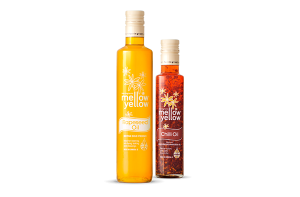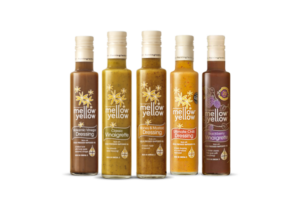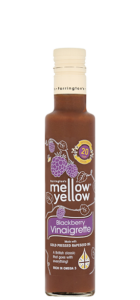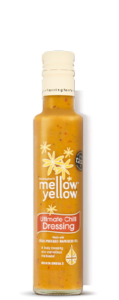Jamie Oliver Food Tube channel is packed full of great tips and recipes for you to try at home and is well worth a visit.
We were of course very excited when he uploaded the “How to make mayonnaise with Jamie Oliver” website featuring our own Farrington’s Mellow Yellow. If you want to try to make your own mayonnaise, Jamie gives you simple step by step instructions. Alternatively, you can buy our own Mellow Yellow Mayonnaise (it’s completely additive free, using only quality ingredients, just like you would use at home).
We are immensly proud that our entire range of Farrington’s MELLOW YELLOW cold press rapeseed oil, dressings and mayonnaise has been approved by the Vegetarian Society. Sharing an ethos of tracability, quality ingredients and no-nonsense food production makes our range a great choice for customers who wish to make informed choices about the food they eat.
Our entire range of Farrington’s MELLOW YELLOW products including our Mayonnaise, Garlic Mayonnaise, and three dressings, has been Coeliac UK Approved and listed in their directory of gluten-free products. The care and attention we commit to producing no-nonsense natural products with carefully selected and sourced ingredients has resulted in a range of truly delicious, healthy and trusted favourites.
As we approach midway through the year, I realise just how far behind, not to mention how embarrassingly bad our crops look this year. So much so that the BBC want to come and film some of our fields and generally humiliate my farming prowess publicly. It is a story that although I would rather not be telling, does have a serious point and whilst this will have a major financial impact on our farm over the next eighteen months, it is a problem that extends far beyond our farm gate. I call it Embarrassing Crop Syndrome.
Major food manufacturers are starting to plan for the shortage of British grown crops over the next year or so. Companies such as Weetabix and McVitie’s have both announced they will have to source some of their wheat from abroad to make up for the shortfall grown in Britain. Or as I learned on a recent farm visit to a vegetable producer, supermarkets are having to accept that contracts will not all be met for supply, with agreements being renegotiated to accommodate the late season. Additionally, as well as vegetables and fruits being later to harvest, customers are also accepting that these crops may well be smaller in size than the normal strict criteria set. This shows that even the all powerful retail sector can not dictate to the weather if it does not want to play ball.
Currently, our rapeseed, where there is a crop, is in flower, but the plants are still very small and sparse. I can not see how this will make up the lost ground to give a normal yield. Although rapeseed does have an incredible ability to compensate when it does start growing in the spring, time is running out for it to manage this. Likewise, with the autumn planted wheat fields, they are simply not growing as quickly as I would like. On a brighter note, our spring planted crops of wheat, barley and beans are growing well in the warmer weather, so I hope they at least will bring some good results.
Thankfully we are not taking part in the annual Open Farm Sunday which takes place on 9th June this year. However we are welcoming some of our customers to the farm during June to see how we grow, press and bottle our rapeseed oil. The last two parts of this are not an issue, as we can proudly show them our latest investment in the oil pressing factory, however, the growing bit will cause a slight problem. It has even been suggested by one happy neighbour with a big grin on his face, who does have a field or two of good rapeseed, that we take our customers to look at his crop instead – it’s certainly a tempting offer, even if it was meant tongue in check. However, I am working on the principle that our customers will be able to appreciate how we have to work with nature, and this year is hopefully an exception and will not become the norm.
Anyway, that’s enough doom and gloom, in the next couple of months harvest will arrive and with it will be our chance to say goodbye to the disaster of the 2013 crops. Then we can look forward to planting next year’s crops which of course will grow fantastically well, in ideal weather conditions, so we can all look forward to talking about how good 2014 crops will be. In the meantime, I just need to find a harvest student to help clear this lot out the way first.
Farming Diary
From LEAF Demonstration Farmer Duncan Farrington
Eli Farrington reveals what you might not know about this underused British ingredient
1. A truly versatile all-purpose culinary oil; cold pressed rapeseed oil contains the optimum ratio of 1:2 of omega 3 to omega 6, as well as being a natural source of
vitamin E.
2. It has the lowest saturated fat content of any widely available culinary oil – half that of olive oil!
3. Cold pressing is the traditional and natural way to produce oil. It is gently squeezed out of the seed at temperatures below 40C ensuring that the natural goodness and character of the oil is preserved.
4. The delicate, gentle flavour makes it an ideal partner for almost any food, great for drizzling or dipping.
5. Farrington’s Mellow Yellow emulsifies beautifully making it perfect for dressings, mayonnaise, pesto, and hummus; a healthy complement to starters, salads and vegetables.
6. With a smoke point of 220C, cold pressed rapeseed oil is a wonderful high temperature cooking oil, making the most perfectly golden and crispy roast potatoes, and aromatic, nutty stir-fries.
7. A delicious and healthy substitute for butter and margarine, when you bake with this oil it produces deliciously moist and light cakes that feature a subtle nutty flavour. It’s fabulous used in flapjacks and brownies. When substituting butter with our oil, add a little
less, about 80% of the total weight required and make up the remainder with a liquid such as milk, rice milk or soya milk. This is to account for the milk part and the fat content of the butter. If substituting for margarine, the rapeseed oil content would need to be less, about 75% (with more milk) as there is a higher water content in margarine.
8. As we only use oil from the first pressing of our rapeseed it is the culinary equivalent to extra virgin, cold pressed olive oil.
9. There is no such thing as commercially grown GM rapeseed in Britain.
10. First cultivated in Britain by the Romans; rapeseed oil has been used throughout Europe since the 16th century.
We were so utterly delighted when the lovely Sarah Scott (food writer and columnist for Vegetarian Living magazine and blog A View from the Table) stumbled across our Mellow Yellow mayonnaise and created this warming recipe for potato salad.
To read Sarah’s recipe and her blog, click here.
Today I want to mention career prospects in food and farming as barely a day goes by when we don’t hear about the dire state of the economy and the lack of job prospects, especially for young people. As a country, we do continue to bump along a continual trough of the economic cycle and for many people things really are tough. Over the last thirty or so years, the UK economy has largely been built on the very successful service and financial sectors, with little regard given to either manufacturing or agriculture. Now I think it is fair to say that everyone agrees there needs to be a bit of rebalancing in UK plc if we are to ensure future success.
People are beginning to appreciate that Britain does have a successful manufacturing industry, whilst not big enough we do make products to be proud of that the rest of the world want to buy. This is an industry that requires people at all levels and is busy recruiting. The same can be said for agriculture and the food supply industries, which have undergone a complete turnaround in fortunes over the last twenty years.
When I first came back to the farm, the world was awash with food that no one wanted, whilst Government saw agriculture as a backward industry, in decline, that should be used solely to provide the role of national park keeper for society. Agricultural colleges and universities closed down due to lack of interest, the industry was on its knees financially, and public perception was at an all time low. Today the world is a lot different place, with a growing global population which can afford food, in addition to other non-food resources the industry can provide, there has never been a better time for people to look at a career in food and farming.
Currently, there are around 476,000 people employed on farms in the UK. Farming and the food supply industry grows around 70% of the food we eat, manage over 80% of Britain’s land, it is worth £10bln a year and if you were to add in the supporting industries the figure increases substantially. An extra 60,000 jobs will be created in the next ten years. 98% of graduates from land-based degree courses go directly into careers.
Not everyone is aware of the great potential for future careers. However, job roles encompass everything from farming to finance, research, robotics, environment, policy, veterinary as well as design, media, marketing and much more. Additionally, it is far from being a male-dominated industry, as plenty of very successful females at all levels will testify. Whilst some schools and career advisers still think of the industry as a last ditch option for students, there are plenty of colleges and universities who would be happy to show how this is not the case. There are other useful organizations giving impartial advice such as LANTRA at www.lantra.co.uk/careers . Or a new joint industry initiative called Bright Crop which is due to go live later this year www.brightcrop.org.uk .
If you or someone you know is considering what they might want to do for a future career, why not take a look at what food and farming has to offer.
The first jars of our NEW garlic mayonnaise are now starting to appear on the shelves. Packed full of roasted garlic pieces, Farrington’s MELLOW YELLOW Garlic Mayonnaise is gluten and additive free, created from our original MELLOW YELLOW Mayonnaise recipe using free-range eggs, and with all the health benefits of our cold pressed rapeseed oil, always at the heart of our products.
We are extremely excited to launch the latest addition to the MELLOW YELLOW range, and have had a really positive response from taste tests. People love the bursts of garlic in this truly artisan product. We are confident that the newest twist on our classic mayonnaise will not only be the perfect complement to barbeques and summer cuisine but will also become a popular store cupboard staple for all occasions.
As the end of the British winter approaches Farrington’s are looking ahead to summer days in readiness to dollop their delicious and versatile Garlic Mayonnaise for the barbeque season, a perfect accompaniment for a wide range of foods, including meat, fish and shellfish, a dip for crudités and canapés, in sandwiches and hamburgers, or with spicy dishes such as samosas, onion bhajis or kebabs.
Let us know what you think of the bold new taste, and share your favourite serving suggestions!
Yes we are still waiting for spring as the weather continues to be against us. I do find myself sounding like a broken record, each day waking up, looking eagerly out of the window to see if anything has changed, but in reality feel like we are playing a part in the film Groundhog Day.
As you may gather we still haven’t done much useful on the farm in the last month. It’s been too wet to cut hedges; dig out ditches or drain land; apply fertilizer to the crops in the ground; plant crops not in the ground. By now I would like to be looking at planting our spring beans if not already done so. The latest 30mm of rain and snow over the last few days, means we are not going to be doing anything anytime soon.
We have been shopping though in the last few months. On the farm, we have just taken delivery of a new sprayer. This is a major investment which lasts around ten years. As with all such toys, the price continues to rise, as does the level of sophistication we hope to make the most of. This latest British-built machine comes with a full compliment of GPS auto-guided controls, ensuring we can get the most efficient use of the fertilizers and agrochemicals the machine will apply over its lifetime. This will ensure we put exactly the right amount of product on in the right place, with the obvious benefits that brings. Complete with touch screen display and joystick controls in the tractor cab, it is ideally suited for the X-box generation, so, unfortunately, I won’t be getting to drive it much myself.
In Farrington Oils we have also been spending money, with the last piece of investment now in place and just about finished, being commissioned. This is a new filter to remove sediment from the rapeseed oil before it is bottled. Ever since starting the company, filtration, especially in cold weather has always been my biggest problem. However this latest filter will sort this issue out, albeit at vast cost. Our previous filters had been very much manually operated – fine when things are going well, but needed coaxing along to get the best out of them. There was a lot of down time when filter sheets needed changing and cleaning down, it was often a messy job and created plenty of unusable wastage. This new Anglo-Dutch machine works exactly the same as the old one in principle, but with a level of automation that should mean it is pretty much self-sufficient, it filters and cleans itself automatically, as well as reducing the waste dramatically. We are currently in the process of rigging it up with its own mobile phone so it can call me or Martin in the middle of the night if something goes wrong and it needs a little help. If we gave it internet connection, we would be able to control it from a smart phone without getting out of bed, but as internet connection is not the best in rural Hargrave, that might just be asking for trouble.
I genuinely thought that this month I would be writing to report that we eventually caught up with planting all the wheat, and everything looks better than expected. However that didn’t happen as we are no further ahead than a month ago, so without further ado; the weather, slugs, crop planting and soil conditions are all banned subjects as we move towards Christmas, Keeping Warm for Winter.
Winter jobs are now well underway, which has started with some hedge laying. It is ideal to have a variety of different sizes, shapes, and ages of hedges to give habitat variety on the farm. Over the years we have planted several hedgerows, which are cut every two to three years with a tractor mounted machine to create a dense hedgerow. With some of the older hedges, if they are left for many years, eventually they become very big and lanky, requiring more extreme measures, as is the case with the hedge we are laying this year. It has become full of weedy trees rather than dense hedgerow, so we are cutting and removing many of the trees, whilst leaving a few healthy ones to enhance the landscape. Then the remaining understory of Quick and Blackthorn bushes are cut part way through at the base, before being pulled down and laid horizontally along the hedge line. These laid plants will sprout new growth in the spring. Once the hedge is laid, we will ‘gap up’ any spaces with newly planted hedging plants. The end result being a lovely stock proof hedge in a couple of year’s time that will be fit for another hundred years, as well as some great logs to keep us warm in the winter.
As well as work on the farm, I have been travelling around the country to various events. Of note, I spent an excellent day at the LEAF President’s event at HSBC headquarters in London, where we had some fascinating speakers on how food production is going to feed 9 billion people over the next 30 years in a manner that will look after the planet at the same time. Then there was breakfast with the Chief Economist of the Bank of England, as he travels the country gauging the pulse of the economy to help formulate future policy. A trip to a factory in Yorkshire to inspect my latest machine being built to filter oil; this was a surprise as they have built a major part of it incorrectly and unless they are planning for gravity to go up a hill, they will have to quickly rectify the issue before I take delivery of it.
In Farrington Oils, my Production Manager Rob has now retired after nearly five years with us. His passion meant that he never missed a customer order, and he made sure every bottle of oil produced was top quality. We wish Rob well in his retirement, and welcome Martin to the team, to take us forward over the next chapter in the Farrington Oils story.
The guys are flat out at the moment with oil production and orders as everyone is looking to buy our products ready for Christmas, whether it is to roast Christmas spuds or to buy a gift bag for a friend. Of course without our customers over the years we would not have a business, so from all of us here, a big thank-you to all of you who continue to support us. Have a lovely Christmas.
Farming Diary
From LEAF Demonstration Farmer Duncan Farrington

 Oils
Oils Rapeseed Oil
Rapeseed Oil Chili Oil
Chili Oil Dressings
Dressings Blackberry Vinaigrette
Blackberry Vinaigrette Classic Vinaigrette
Classic Vinaigrette Balsamic Dressing
Balsamic Dressing Honey & Mustard
Honey & Mustard Ultimate Chilli Dressing
Ultimate Chilli Dressing